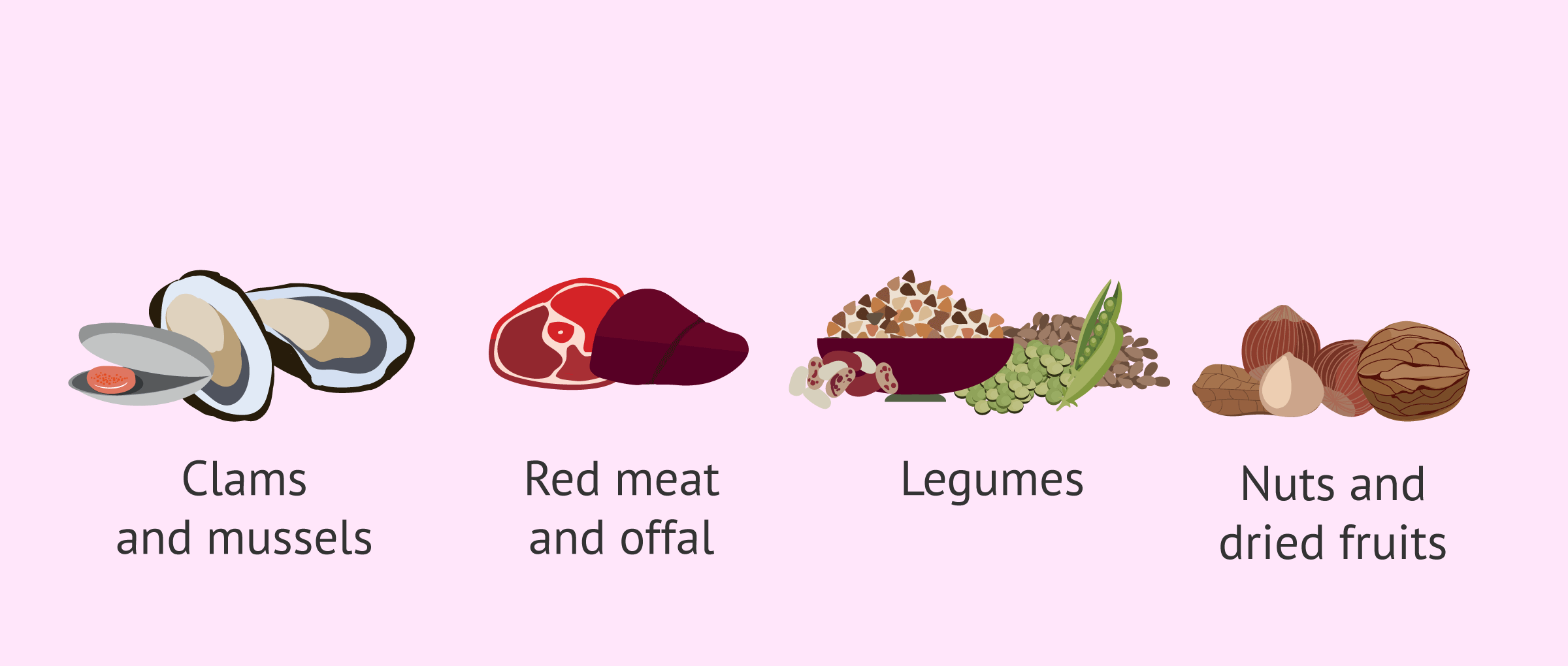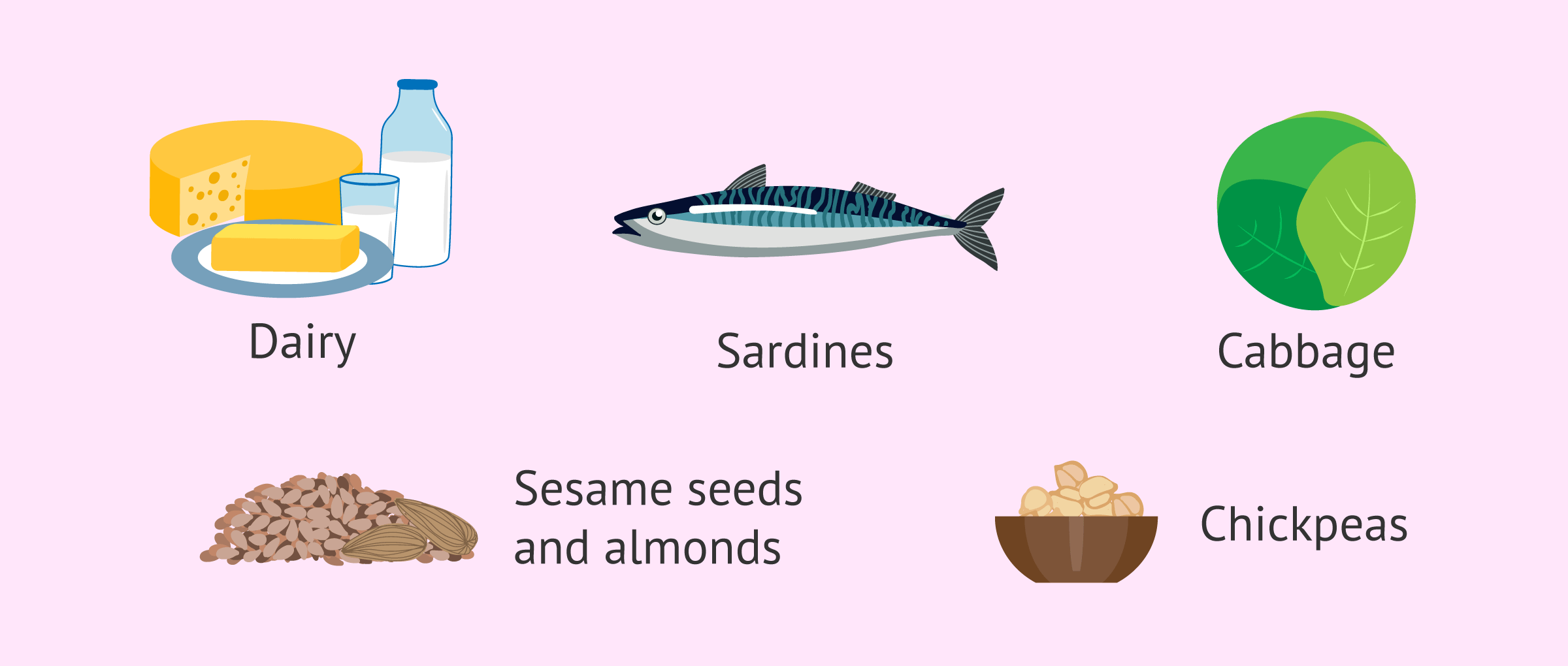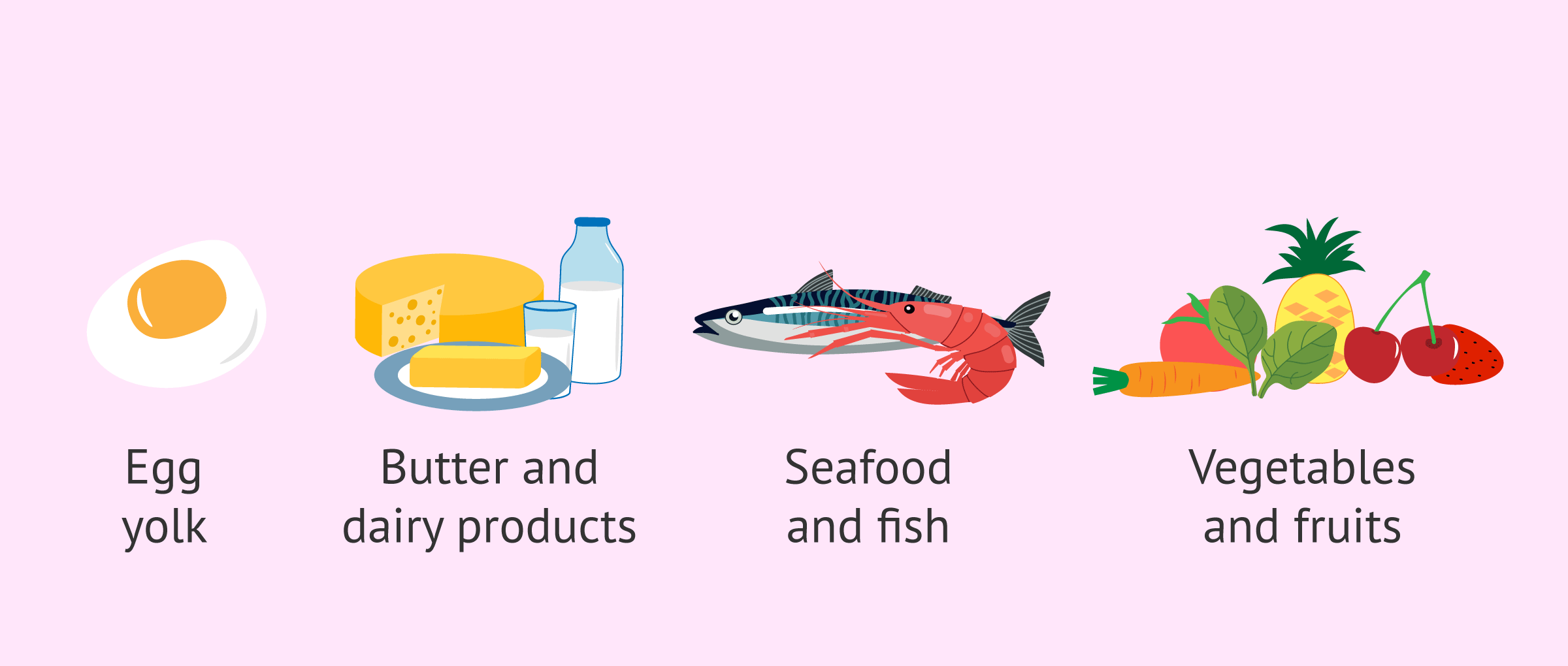During pregnancy, many changes occur in a woman and the fact that a new being is growing inside her makes it necessary to control the supply of vitamins and minerals.
It is very important to have a healthy and varied diet, to try to supply the number of nutrients that will require this special situation such as pregnancy.
On the other hand, the intake of vitamin supplements before and during pregnancy should always be supervised by a specialist. An excess of these supplements could be detrimental to the proper development of the baby.
Provided below is an index with the 10 points we are going to expand on in this article.
- 1.
- 1.1.
- 2.
- 2.1.
- 3.
- 4.
- 5.
- 6.
- 7.
- 7.1.
- 7.2.
- 7.3.
- 7.4.
- 8.
- 9.
- 10.
Folic acid
The relationship between low folic acid levels and neural tube defects has been extensively studied. These defects have their origin in an alteration in the fusion of the neural tube during embryonic development. Such an alteration may result in the birth of a baby with spina bifida, whose spine and spinal cord have not formed correctly.
However, most neural tube defects could be avoided with adequate folate intake. Therefore, folic acid supplementation is usually advisable even before pregnancy, when a woman is seeking pregnancy. In addition, the recommended dose of folic acid will be higher if the woman has a history of neural tube defects.
Sources of folic acid
Despite the above, diet also plays a fundamental role and it is recommended to eat foods rich in folic acid such as:
- Green leafy vegetables and fruits.
- Legumes.
- Liver.
- Cereals.
- Nuts.
On the other hand, it is very important that the specialist controls the dosage and the period of time during which the woman should take folic acid supplements.
Iron
Iron is essential for the correct transport of oxygen to all our organs, as it is part of the hemoglobin in the red blood cells. If there is an iron deficiency, which is possible in pregnancy because the needs are greater, iron deficiency anemia may occur.
In addition, low hemoglobin concentrations have been associated with low birth weight, preterm delivery, and even perinatal mortality. This is why the specialist may consider it necessary to prescribe iron supplements to the pregnant woman, especially when she has reached mid-gestation.
Sources of Iron
In terms of diet, some foods rich in iron are:
- Clams and mussels.
- Red meat and offal.
- Legumes.
- Nuts.
On the other hand, it is important to mention that iron supplements should be taken on an empty stomach or with sufficient time between meals. In addition, avoid taking this type of supplement with milk, as it hinders its absorption.
Calcium
The supply of calcium from the mother to the fetus is also essential for the correct development of its bones and teeth. In addition, low levels of this mineral have been linked to preeclampsia in pregnant women.
However, the necessary calcium intake is usually obtained from the diet. Therefore, it is unusual for pregnant women to have to resort to supplementation. In this sense, foods rich in calcium are the following:
- Dairy
- Sardines.
- Cabbages.
- Sesame seeds and almonds.
- Chickpeas.
However, there are certain cases in which calcium supplementation may be necessary. For example, in women who do not ingest adequate amounts of calcium, the specialist may prescribe supplementation.
Vitamin A
It is true that vitamin A is necessary during pregnancy, as it could prevent certain obstetric complications. However, high doses of this vitamin could have adverse effects on the fetus such as malformations.
This is why the diet should provide the vitamin A needs of the pregnant woman, through the intake of foods such as:
- Egg Yolk.
- Butter.
- Seafood and fish.
- Vegetables and fruits.
In this way, vitamin A requirements can be met through diet, thus avoiding unnecessary supplementation. In addition, it will be better if the pregnant woman obtains this vitamin from plant foods.
Iodine
Iodine is part of thyroid hormones and is an indispensable element for brain development. However, dietary intake of this mineral does not usually meet the needs of pregnant women, so iodine supplementation may be necessary.
This iodine intake may be desirable even before pregnancy and maintained during lactation, as the baby's brain development continues into infancy. Nevertheless, caution should be exercised with the excess of this mineral, because it has been associated with thyroid problems.
Other requirements
The consumption of omega-3 fatty acids through the intake of oily fish is advisable, as it reduces the risk of some obstetric complications such as preterm delivery. In addition, these fatty acids are essential for the development of the nervous system. However, some specialists may consider omega-3 fatty acid supplementation necessary in pregnant women.
Finally, there is no generalized (to all pregnant women) supplementation with other vitamins such as vitamin D, vitamin E or vitamin C. However, the intake of these and other nutrients through the diet is important.
FAQs from users
Is it necessary to take vitamins before pregnancy if I am seeking pregnancy through assisted reproduction?
Vitamin D supplementation before pregnancy is not a routine practice in the field of assisted reproduction. However, such supplementation would be indicated in those women who are seeking pregnancy and who are known to be vitamin D deficient, since vitamin D deficiency during pregnancy has been associated with an increased risk of miscarriage and complications during pregnancy.
Women at higher risk of vitamin D deficiency are those with dark skin, vegan diet, little exposure to sunlight, or a history of a baby with rickets or a body mass index (BMI) > 30.
Read more
What are the consequences of low vitamin D levels in pregnancy?
Vitamin D levels are of vital importance during pregnancy, as vitamin D deficiency can lead to an increased risk of preeclampsia, gestational diabetes, impaired immune system and low birth weight of the newborn.
Vitamin D has multiple and vital physiological functions such as regulation of metabolism, maintenance of bones and teeth, involvement in the proper functioning of the immune system and participation in the process of insulin secretion.
According to a Cochrane review, supplementation of pregnant women with vitamin D alone is likely to reduce the risk of pre-eclampsia, gestational diabetes and low birth weight, and may reduce the risk of severe postpartum hemorrhage. It is not well known whether it may influence the risk of preterm delivery at less than 37 weeks' gestation.
Can I get the vitamins I need through diet when I am pregnant?
Diet is essential for pregnant women, but sometimes it is not enough to provide the extra nutrients that pregnancy requires.
For example, it is common for pregnant women (and even when pregnancy is being planned) to take folic acid supplements. Its deficiency has very important consequences for the fetus, since it is related to neural tube defects, and the diet sometimes does not supply the necessary amounts.
What are the best vitamins for pregnant women?
Each pregnant woman may have particular requirements, so there are no vitamins that are better than others, but vitamins that are better or worse adapted to the individual situation of each woman.
Therefore, it is essential that the intake of vitamin supplements in pregnant women should always be prescribed and supervised by a specialist.
Recommended readings
If you are pregnant, you may also be interested in reading about the maternal diet in breastfeeding. To do so, you can visit the following link: Mother's diet and nutrition during breastfeeding.
On the other hand, you can learn more about vitamin D and its effect on fertility in this article: Does vitamin D influence pregnancy and fertility?
We make a great effort to provide you with the highest quality information.
🙏 Please share this article if you liked it. 💜💜 You help us continue!
References
Brown B, Wright C. Safety and efficacy of supplements in pregnancy. Nutr Rev. 2020 Oct 1;78(10):813-826.
Glenville M. Nutritional supplements in pregnancy: commercial push or evidence based? Curr Opin Obstet Gynecol. 2006 Dec;18(6):642-7.
Hovdenak N, Haram K. Influence of mineral and vitamin supplements on pregnancy outcome. Eur J Obstet Gynecol Reprod Biol. 2012 Oct;164(2):127-32.
Kontic-Vucinic O, Sulovic N, Radunovic N. Micronutrients in women's reproductive health: I. Vitamins. Int J Fertil Womens Med. 2006 May-Jun;51(3):106-15.
Kontic-Vucinic O, Sulovic N, Radunovic N. Micronutrients in women's reproductive health: II. Minerals and trace elements. Int J Fertil Womens Med. 2006 May-Jun;51(3):116-24.
Milman N, Paszkowski T, Cetin I, Castelo-Branco C. Supplementation during pregnancy: beliefs and science. Gynecol Endocrinol. 2016 Jul;32(7):509-16.
Vitamin supplementation in pregnancy. Drug Ther Bull. 2016 Jul;54(7):81-4.
FAQs from users: 'Is it necessary to take vitamins before pregnancy if I am seeking pregnancy through assisted reproduction?', 'What are the consequences of low vitamin D levels in pregnancy?', 'Can I get the vitamins I need through diet when I am pregnant?' and 'What are the best vitamins for pregnant women?'.
Authors and contributors
More information about Cristina Algarra Goosman








Hi I’m vegan and I am going to try for a baby! I am very interested in this article because I have to supplement with vitamins for not eating meat or fish. Is there anything I should take for the best health?
Hello Asante,
Generally, the vitamins needed to have a good pregnancy can be obtained through diet. If there is a deficiency in the diet you will need to supplement with vitamins.
To make sure you have adequate levels for your age and pregnancy search I recommend that you go to your doctor for a blood test and assess the deficiencies you may have and based on that recommend some vitamins or others.
I hope I have helped you.
Hi, I have read that I have to take folic acid before getting pregnant, why is that? Taking a supplement for something that hasn’t happened yet, thank you.
Hi EllenPG,
Taking folic acid before you are pregnant is recommended as it is an important vitamin for the early development of pregnancy, even when the mother does not yet know she is pregnant.
The presence of folic acid helps the proper development of the neural tube, with spina bifida being the disease to avoid.
I recommend that if you are looking for pregnancy consult with your doctor what vitamins you should take for pregnancy.
I hope all goes well,
Best regards